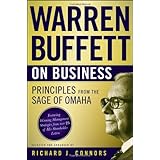
Average Reviews:

(More customer reviews)With the main exception of a relatively small textile producer known as Berkshire Hathaway, which Warren Buffett bought outright and which became the springboard for his investing career, the earlier part of Buffett's long and successful career was mainly devoted to non-controlling investments in companies, versus buying whole companies. Thus, today many people think of Buffett as "the world's most successful investor." However, Buffett's investing skills are not the primary topic of this relatively brief and easy reading book (although there is one chapter on personal investing). This book, written by Richard Connors and based on a class he taught about Buffett at the Washington University in St. Louis Lifelong Learning Institute, is devoted to describing Buffett's management activities as CEO of Berkshire Hathaway. That's not a bad idea at all, given that over the years Buffett has gradually placed comparatively less emphasis on Berkshire's investments (which today include the likes of American Express, Coca-Cola and Wells Fargo) and greater emphasis on Berkshire's growing stable of wholly-owned subsidiaries. Indeed, the list of owned companies, like GEICO, International Dairy Queen, Shaw Industries, FlightSafety, Borsheim's Fine Jewelry, Nebraska Furniture Mart and The Pampered Chef, among numerous others, has grown quite large.
The prime source for this book--by far--is Buffett's annual letters to Berkshire's shareholders, written over the last 40 years. Indeed, if you were to count words, my guess is that 95% or more of this book is simply the reproduction of Buffett's comments in his various letters, organized by Connors, the book's author. So if you have read Buffett's letters over the years (an exercise I would recommend to almost anyone interested in business or investing), then you won't find much new material in this book, save for excerpts from occasional interviews with Charlie Rose or excerpts from some of Buffett's other interviews or comments.
Connors has organized Buffett's shareholder commentaries into chapters that address the various important issues of corporate management: executive compensation, time management, assessment of risk, corporate governance and culture, crisis management, capital allocation and shareholder communication, among others. Buffett's comments are interesting, valuable and candid, and he is a very clear and entertaining writer. There is some human interest material, such as an account of Buffett's 1951 Saturday trip to Washington, DC to visit the offices of GEICO (because his mentor, Benjamin Graham, was the chairman of the company). As the somewhat well-known story goes, Buffett pounded on the door to GEICO's locked building, until a custodian finally led him to meet Lorimer Davidson, an assistant to GEICO's president at the time. Davidson, who would go on to become CEO of GEICO, took the time to educate young Buffett on the power of direct marketing of insurance, and years later Buffett would go on to buy the whole company.
In short, although there is precious little new material provided here (hence the four-star rating, not five), this is a very interesting book, and it is interesting primarily because it was essentially written by Warren Buffett, one of the most successful investors--and corporate managers--of all time.
Click Here to see more reviews about: Warren Buffett on Business: Principles from the Sage of Omaha
Click here for more information about Warren Buffett on Business: Principles from the Sage of Omaha

0 comments:
Post a Comment